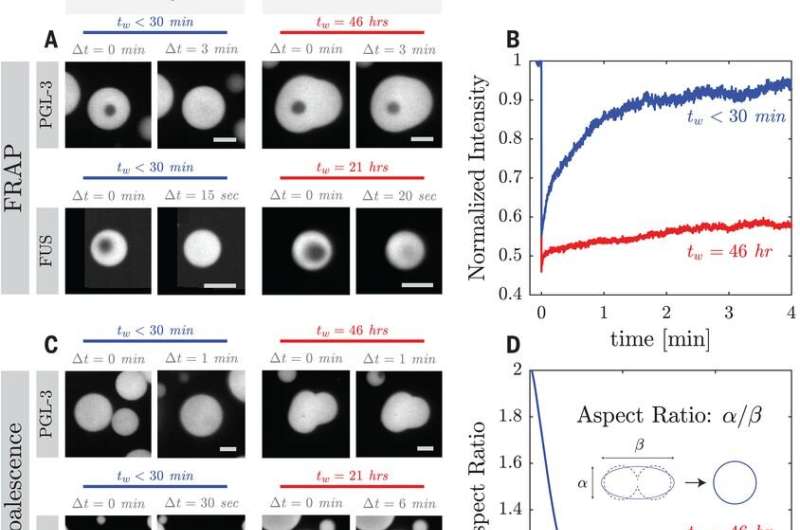Protein droplets exhibit age-dependent material properties. Credit: Science (2020). DOI: 10.1126/science.aaw4951
A team of researchers affiliated with several institutions in Germany and Austria has developed a way to characterize the time-dependent material properties of certain protein condensates. In their paper published in the journal Science, the group describes using laser-tweezer-based techniques to better understand time-dependent material properties associated with protein condensates. Huaiying Zhang with Carnegie Mellon University has published a Perspective piece outlining the work by the team in Germany in the same journal issue.
As the researchers note, protein condensates are fluids that can undergo changes to their properties over time. They also note that little research has been done to better understand such changes. In this new effort, the researchers used laser tweezer-based techniques to better understand what happens as such proteins change over time.
The researchers began their effort by noting that under some conditions, protein solutions can form protein-dense droplets due to phase separations. And prior work has shown that such phase separations can also be in the form of liquid-liquid phase separation droplets where the proteins they contain are highly concentrated but remain dynamic. In their work, the researchers discovered the nature of the properties of proteins that had been hardened over time. They did so by manipulating samples while studying them using optical tweezers and by using microrheology (where rheological properties of a fluid are studied by measuring the trajectory of a flow tracer).
They discovered that the hardened condensates behaved like a Maxwell fluid—the elasticity remained largely unchanged with age while the viscosity increased. For that reason, the researchers named the material a Maxwell glass. They also noted that the relatively unchanged nature of the elasticity of the fluid indicated that the hardening was not a gelation process (in which molecules become cross-linked). The researchers also observed an increase in protein density and shrinkage in size by using fluorescent microscopy.
The team says their work provides evidence of biological condensates made from different proteins that can be described as Maxwell glasses—they note also that such proteins suggest they may be involved in unique kinds of cellular functions compared with those that remain in a gel-like state.
More information: Louise Jawerth et al. Protein condensates as aging Maxwell fluids, Science (2020). DOI: 10.1126/science.aaw4951
Huaiying Zhang. The glassiness of hardening protein droplets, Science (2020). DOI: 10.1126/science.abe9745
Journal information: Science
© 2020 Science X Network
























